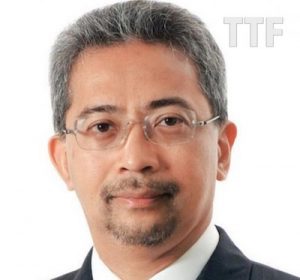TTF: Mahathir spent his entire political career opposing the aristocratic culture.
He believed that the concept of succession by kinship as practiced by rulers was outmoded and reflective of ancient Hindu cultures that did not apply to Muslims.
Ironically, he spent the same career practicing favouritism of kinship by dishing out contracts to his children without calling for proposals through open tenders.
According to Section 23 of the MACC Act, it is an abuse of power for one to use his (or her) position in public office to make a decision or take an action for the benefit of himself (or herself), his (or her) kin or associate.
Mirzan Mahathir is Dr Mahathir Mohamad’s son.
Mahathir, on the other hand, is the Prime Minister of Malaysia.
Yesterday, the Government of Malaysia (GoM) was accused of Cronyism and nepotism following reports that the Ministry of Finance appointed a Petron Malaysia unit as fuel provider for government vehicles.
Mirzan owns shares in both Petron Malaysia (PEM) and its parent concern, Petron Corporation (PCOR).
On the 15th of December 2010, a Philippine conglomerate specialising in food and beverage, San Miguel Corporation (SMC), exercised a share option that gave it 68.3 percent of PCOR’s stakes.
A press release by Petron Malaysia dated the 5th of June 2013 confirmed that Mirzan did indeed hold substantial shares in the holding company and was a member of its board.
If that isn’t enough to convince you that Mirzan is behind PEM, several sections of PCOR’s and SMC’s by-laws stipulate that one needs to be a shareholder in order to sit on the directorial board of any of its companies.
Mirzan was elected director of PCOR on the 13th of August 2010.
That should put to rest any doubt that the son of Mahathir is indeed a stakeholder in the largest oil refining and marketing company there is in the Philippines.
What this means, is that Mahathir may have abused his position in office if indeed it can be proven that he directed the Ministry of Finance to appoint an oil and gas unit belonging to his son as fuel provider for government vehicles.
On the 1st of June 2018, I wrote (in red):
Early in January 2013, a large number of Malaysians became confused when Petron Corporation (PCOR) commenced the rebranding of almost 600 Esso and Mobil gas stations nationwide. These stations were inherited by PCOR through its acquisition of ExxonMobil’s downstream business in 2012 with EXCEL Petroleum, an industrial lubricant concern. The acquisition turned Mirzan Mahathir into a major petrol pump operator and the largest competitor there was to Petronas, an oil and gas giant fully owned by the Government of Malaysia (GoM).
I added:
By virtue of PCOR’s holding of ExxonMobile’s downstream business – or, business that concerns marketing, refining and retail operations, Mirzan has somewhat of an exclusive say in the way retail is handled across the Peninsula of Malaysia, Sabah and Sarawak. He does not, however, have access to ExxonMobile’s oil exploration, extraction, shipping and wholesale operations, activity that brings in ten times more profit than retail. That access was provided to him in 2013 though through a massive network of associations that involved his brother, Tan Sri Mokhzani Mahathir.
Finally, I said:
Mokhzani’s flirt with the oil and gas industry began with Kencana Petroleum Berhad, an integrated engineering and fabrication oil and gas production outfit that specialised in building and supplying drilling rigs. Despite being the record holder for providing the world’s tallest movable wellhead platforms, the company lacked deepsea drilling technology on par with what the Chinese had developed for exploration in the South China Sea. Mokhzani began looking for partners who could provide the service and knowhow but refused to consider Petronas as an option.
Mokhzani’s father, Mahathir, was sore that Najib had not revived plans to build a crooked bridge to replace the Malaysian side of the Johor-Singapore causeway. The whole purpose of the bridge was to force Singapore into renegotiating Maritime Security arrangements with Malaysia in ways that would grant our country access to oil rich areas at the edge of the South China Sea. Najib’s refusal to revive the project made dealing with Petronas less appealing. While Mahathir sat contriving plans to oust Najib as a measure of vendetta, Mokhzani turned to his childhood friend and longtime associate, Tan Sri Shahril Shamsuddin.
FOR FULL DISCLOSURE, CLICK HERE.
Summarised, all of the above reads:
1. Mirzan Mahathir is already a major petrol pump operator in Malaysia and the largest competitor there is to Petronas.
2. Both he and Mahathir are opposed to appointing Petronas units as fuel providers for government vehicles as the oil and gas concern may still be dealing with companies involved with oil exploration, extraction, shipping and wholesale operations that may somehow be tied to Najib’s people.
3. As a result, the GoM brought Mirzan a step closer to becoming Malaysia’s “Petrol Pump King” by quietly appointing a unit belonging to him as fuel provider for government vehicles.
Salam Malaysia Baru
![]()
PETALING JAYA: The Malaysian government faces accusations of cronyism and nepotism after news emerged that the Ministry of Finance has appointed a unit of Petron Malaysia as one of the fuel providers for government vehicles.
A letter of appointment addressed to Petron Fuel International Bhd has gone viral on social media, as the Prime Minister’s son, Mr Mirzan Mahathir, is a director of Philippine-based Petron Corporation, which owns Petron Malaysia.
News site Malaysiakini reported that it had verified with government sources that the letter had been distributed to government ministries.
The letter stated that the Petron Malaysia unit had been appointed a fuel provider for government vehicles through indent cards.
It added that it hoped the appointment of the Petron unit would provide “a better choice and alternative” to existing fuel providers.
Mr Mirzan has been a director of Petron Corporation since 2010 and held 1,000 shares in that year.
In 2013, Petron Malaysia said Mr Mirzan did not have any shares or a role in its Malaysian operations.
The Ministry of Finance has been contacted for comments.
Source: The Straits Times




